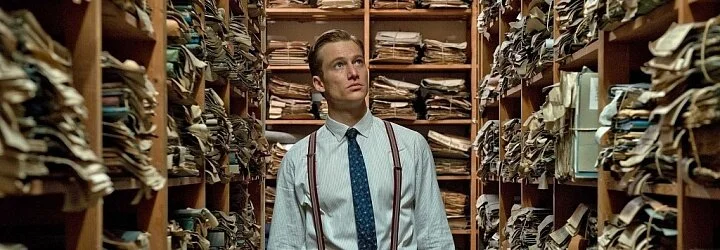Labyrinth of Clichés
Originally published on kultur360.com.
When a review of Labyrinth of Lies (Labyrinth des Schweigens) appeared in Die Zeit, the reviewer asked whether it was possible to imagine a time when Auschwitz wasn't known to everyone as the embodiment of evil (and German responsibility for that evil). But it is possible to imagine such a vacuum, at least if you live in the Canadian constituency of Hamilton West-Ancaster-Dundas. In the recent parliamentary elections, the New Democratic candidate Alex Johnstone, a school board trustee with a Master of Social Work degree, was embarrassed when it was revealed that she had made a joke about Auschwitz on Facebook. (She commented on a friend's page that his photos of the camp's concrete fence posts looked phallic.) When her Facebook posting was made public, Johnstone claimed that she didn't know what Auschwitz was.
Perhaps she did know what Auschwitz was, and thought it better to claim ignorance in order to avoid the worse charge of racism. But if we take her at her word, that tells us one of two things: the Canadian education system is woefully inadequate, or people can go through life blissfully ignorant of some of the worst crimes in human history.
“People wanted to look forward, not back”
In late 1950s Germany, however, there was a third option: willful ignorance. The Wirtschaftswunder was in full swing, and people wanted to look forward, not back. But one reason Germany didn't end up sweeping the past under the rug was the tenacity of some prosecutors to pursue murderers from Auschwitz before the statute of limitations made trials impossible. Labyrinth of Lies tells the fictionalized story of one of these prosecutors and how he had to overcome derision and indifference to bring these criminals to trial.
It's not surprising that this film is Germany's submission for the Academy Award for Best Foreign Language Film. In the past dozen years, half of the films nominated by Germany have been historical films set in or referring to the Third Reich or the GDR. Some, such as Oliver Hirschbiegel's Downfall, have been attempts to bring history to the screen, whereas others, such as Georg Maas's Two Lives, create fictional stories to illustrate historical issues. Labyrinth of Lies does both: heavily researched and featuring mostly historical figures, it is nonetheless fictional in that its protagonist, Johann Radmann (played by Alexander Fehling), is a composite character based on a couple of the original Auschwitz investigators. Many in the German film industry might have preferred seeing Sebastian Schipper's inventive Victoria nominated (read the kultur360 review), but the Oscar rules require foreign language films to have no more than 40% of their dialogue in English (and someone figured out that Victoria is 49% English).
Like so many historical dramas from Germany in recent years, great care is taken with the production design and colour palette to produce a look that strikes one as authentic. Authenticity in historical films is a funny creature; the viewer has certain expectations, and if the filmmaker can meet those expectations, the film will be described as authentic, even if the viewer has no real experience or knowledge of the period or place in question. Little details must be slightly exaggerated to emphasize for the viewer that care has been taken with historical detail, and first-time feature director Giulio Ricciarelli doesn't disappoint - horn-rimmed glasses and 1950s dresses abound. The film provides numerous shots of post-war Frankfurt architecture, particularly the circular staircases that Radmann ascends or descends with astonishing frequency (no wonder Fehling is able to remain so thin). But this is the 1950s, so damage from the war must be seen as well. A nice confluence of the 1950s as a decade of optimism is channeled most forcefully through Radmann's dress-designing girlfriend Marlene Wondrak (played by Friederike Becht). The location of her shop - a decaying basement suite in an apartment building courtyard - reminds us that this optimism is built on the ruins of the Second World War.
The tension between optimism for the future and pessimism about the past is at the heart of this film. The people around Radmann can't understand his willingness to remind everyone about Nazi crimes; people are either in denial or simply don't want to be bothered by it. But Radmann himself is simply not the optimistic type. A new prosecutor, he's dissatisfied with prosecuting traffic offenses; he wants more interesting cases. He dislikes his mother who has moved on after the disappearance of his staunch anti-Nazi father on the eastern front. As he sinks into the labyrinth of information, misinformation, and governmental obstruction that protects the Auschwitz murderers, Radmann's obsession drives him to the point of despair. He pushes away those closest to him: his girlfriend who can't stand being around him anymore, and even the journalist Gnielka (played by André Szymanski) who tipped him off in the first place and has become his close friend and collaborator.
Radmann discovers, to his great disappointment, that everyone is implicated in either the Nazis' crimes or the repression of them: the Attorney General, whose anti-Nazi bona fides are beyond reproach, won't go after Mengele, preferring to prosecute smaller but obtainable fish; even the self-righteous Gnielka, who reveals that he was forced to work at Auschwitz as a 17-year-old; his revered father, discovered by Radmann to have joined the Nazi party. He's even angry at himself for not having recognized the deception and lies in the first place. Unable to deal with the guilt, he leaves the prosecutor's office for private practice. But there he notices a distinct lack of interest in justice, so he leaves that job as well.
“Had this been an American film, the fictional Radmann could have been played by Ben Affleck.””
In the throes of this existential crisis, Radmann visits the ailing Simon Kirsch, an Auschwitz survivor, and promises to go with Gnielka to the camp to say kaddish for Kirsch's two children whom Josef Mengele had selected for his special ward. Afterwards he returns to work at the prosecutor's office. The Attorney General asks him why, and he says something to the effect that we can't change Auschwitz, so we had better live good lives. More ex-Nazis are rounded up, and even though Mengele escapes the long of the arm of the law, the film ends on a positive note as the trial is about to begin. Even the relationship with Marlene seems to be on the mend. All is well in Germany.
But not all is well in this viewer's mind. The film's symbolic gestures are often heavy-handed. Arresting the former Auschwitz guard turned school teacher as he is separating the schoolchildren into two groups seems a bit obvious. The harmony among the Jewish survivor, the remorseful guard, and the angry member of the second generation? Sure, that’s nice to see, but it is also self-congratulatory, and suggests premature reconciliation and closure, rather than Germany’s ongoing efforts to confront its past.
Had this been an American film, the fictional Radmann could have been played by Ben Affleck, the master of portraying the earnest yet self-deprecating (and sometimes self-harming) hero. The film would work well as an Affleck vehicle: there is no ambiguity about how to understand or deal with the legacy of Auschwitz, or the events that led to the Auschwitz trials of the 1960s. Fehling plays this role well, but in a much more complex film about Auschwitz, Robert Thalheim's 2007 Am Ende kommen Touristen (And along Come Tourists), Fehling was able to play a more nuanced observer of Auschwitz and its role in German memory politics. Set in the present, Thalheim’s film considers how each generation—and by extension the viewer—must confront the atrocities of the past and establish the significance of this past for the present. In stark contrast, Labyrinth of Lies—with its emphasis on atmospheric authenticity and on giving audiences a chance to feel good about being on the right side of history—diminishes the ability of historical film to teach us real lessons.









